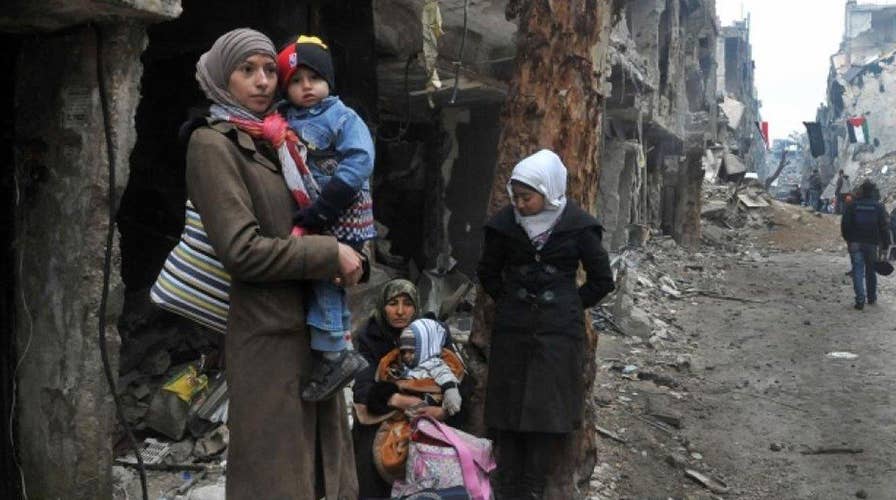How Syrian refugee crisis could impact sanctions on Russia
Insight from Andrew Tabler, author of 'In the Lion's Den: An Eyewitness Account of Washington's Battle with Syria'
The European Union's once-tight unity is being rapidly eroded as hundreds of thousands of refugees and other migrants walk a well-trodden path through the Balkans and into the bloc's heartland.
Greece on Thursday took the tensions to a new level, recalling its ambassador from Vienna in anger after Austria and other Balkan nations held a meeting that could put more pressure on Athens to deal with the migrants. Diplomats saw no precedent in recent EU history for such a move.
As some EU countries move to restrict new entries, those further south and east fear that thousands of migrants will get stuck and overwhelm their nations. That has prompted several to start acting unilaterally, showing little concern for coordinating with their EU partners.
"Right now the unity of the union and lives -- human lives -- are at stake," said EU migration chief Dimitris Avramopoulos at Thursday's meeting of the bloc's 28 interior ministers to assess the rapidly deteriorating situation.
The fear of crumbling unity has spread like wildfire throughout the EU in the last few days. Some see the lack of a common response to the continent's immigration crisis as a Litmus test for the bloc. EU President Donald Tusk has been warning about an unraveling of unity for weeks but the EU now seems to be unable to stop it.
There are even fears that the migration crisis could even fuel the "out" campaign for Britain's EU membership referendum on June 23.
The impact of increasing go-it-alone new border restrictions and refugee quotas was evident on the ground Thursday on Greece's border with Macedonia. Some 2,800 people massed to get into Macedonia but only 100 were allowed to cross.
The bottleneck came after Macedonia severely restricted the number and nationalities of people it is allowing to travel across its territory and continue north toward more prosperous European countries. Macedonian officials have said the move comes in response to similar actions by countries further up along the route, including Serbia and Austria.
"The police kept stopping us, but I couldn't wait," 23-year-old Syrian university student Walaa Jbara said near the border, clutching his smartphone. "I'm checking the news on Facebook, and I know the Macedonians are not letting people through."
Greece is getting increasingly angry about such policies. The government recalled its ambassador from Vienna following a meeting there Wednesday where Austria and many regional European neighbors agreed to tighter border controls -- but did not invite Greece.
The border closures are squeezing Greece between the Balkan nations to the north and Turkey, where most of the refugees are coming from. If northern nations did fully close their borders, Greece's refugee reception capacity could become overwhelmed within days.
NATO is beginning a surveillance mission in the sea between Greece and Turkey and its decision to return any rescued migrants to Turkey could help relieve some pressure on Greek reception centers.
But Greek Deputy Interior Minister Ioannis Mouzalas said his nation refuses to become "a warehouse of souls." He declared that, in the wake of border restrictions that were not common EU decisions, "Greece too, can take unilateral action." Mouzalas threatened to block decisions at a March 7 EU immigration summit if the sharing of the refugee burden was not made obligatory for member states.
Hungary, increasingly a recalcitrant EU member since Prime Minister Viktor Orban came to power in 2010, has called for a national referendum on the EU's plan for mandatory quotas for refugees. The EU head office said it fails to understand how such a vote could affect a decision already made by all EU nations, including Hungary.
The EU plans to share 160,000 migrants who have already arrived in overburdened Greece and Italy with other EU nations over two years. But so far, barely 600 people have been relocated, and only some EU nations have offered places for them -- fewer than 5,000 spots in all.
An immigration dispute has even erupted between Belgium and France, two founding nations who have almost always stood side-by-side in the 60-year history of the union.
On Thursday, French Interior Minister Bernard Cazeneuve criticized its northern neighbor for tightening border controls over concerns about a flood of migrants from a camp in France. Belgium has sent up to 290 extra police officers to their common border after French authorities moved to close a migrant camp in Calais.
Cazeneuve described Belgium's move as "a strange decision" and rejected fears that hundreds of migrants would soon move into Belgium.
In Germany -- the destination of choice for many migrants -- lawmakers on Thursday approved a package of measures to speed up migrant processing and cut the number of newcomers.
The package foresees special centers being set up to quickly process migrants who have little realistic chance of winning asylum. It also means some asylum-seekers -- likely including Syrians -- will have to wait longer to bring their relatives to Germany. Laws were also approved to increase the deportations of foreigners convicted of crimes.
Germany registered nearly 1.1 million people as asylum-seekers last year and officials are keen to ensure that number is lower this year.








































